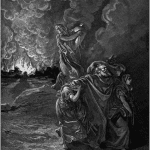Meaning of “Flesh” / Original Sin & Man’s Rebellion / Paul’s Triumphant Solution / Paul & Greek Culture

This is an installment of my replies to a series of articles on the epistle to the Romans (written by St. Paul) by Dr. David Madison: an atheist who was a Methodist minister for nine years: with a Ph.D. in Biblical Studies from Boston University. His summary article is called, “Bad Bible Theology: Paul’s Letter to the Romans: Let me count the ways…that Paul got it wrong” (2-26-18). He devotes a paper to each chapter. Unless he repeats himself (a bad habit of his) or descends to sheer biblical skepticism (which I have less than no interest in), I will reply to all.
The introduction is basically a catalogue of rank insults, where he calls St. Paul “a crank” and a “delusional cult fanatic” and “the prototype for Christian crazies” and “an obsessive-compulsive mediocre thinker and bad theologian” and “an embarrassment.” He adds: “how can anyone take this guy seriously?” That about covers the “content” there. Bears poop in the woods, brats throw fits, squirrels walk telephone lines, and the prevalent anti-theist brand of atheists insult Christians. Ho hum. What else is new?
Thus far, I have counter-replied to 32 of Dr. Madison’s critiques, without hearing one peep back from him as of yet (28 days’ total time, starting on 8-1-19). This certainly doesn’t suggest to me that he is very confident in his opinions. I know he’s still alive and kicking, because I’ve seen him write other posts during this same period (example one / two / three).
Dr. Madison’s words will be in blue below.
*****
Dr. Madison calls his critique of Romans chapter 8, “The Force Field that Protects REAL Christians: Forget the Merit Badge. Go for the Spirit Shield” (7-7-17).
It would not be hard to come up with a list of the Top Ten Worst books or chapters of the Bible, and I suggest that one of the chapters that would get mixed reviews at best is Romans 8. Many Christians would give it thumbs-up because one of the apostle Paul’s famous “Hallmark moments” is found at the end of Romans 8 (vv. 37-39):
“No, in all these things we are more than conquerors through him who loved us. For I am convinced that neither death, nor life, nor angels, nor rulers, nor things present, nor things to come, nor powers, nor height, nor depth, nor anything else in all creation, will be able to separate us from the love of God in Christ Jesus our Lord.”
But the 30-some verses that lead up to this eloquent assurance don’t get as much traffic, and, I suspect, would get substantial push-back from most of the folks who fill the pews on Sunday morning. These people live in the real 21st century world—which wasn’t even supposed to happen, according to Paul—and would not be able to identify with his despondent outlook.
Yeah, the above passage sounds downright “despondent” doesn’t it? Like virtually all atheist apostates, Dr. Madison is determined to see only what he wants to see, and little or nothing else. We continue examining his “caricature-tour” of the epistle of Romans: truly an Alice-in-Wonderland world that is shaped according to Dr. Madison’s whim and fancies and wild imaginings.
Paul is not good news. And the Book of Romans is chock full of bad theology.
Thanks for that information. Whew! That was a close one. What would we do without David Madison advising us that the Apostle Paul is an idiot and raving lunatic? We’d all be lost at sea without a life jacket.
I’m pretty sure that most Christian sensibilities about living a good life would collide head on with Paul’s view of the world, 8:5-8:
“For those who live according to the flesh set their minds on the things of the flesh, but those who live according to the Spirit set their minds on the things of the Spirit. To set the mind on the flesh is death, but to set the mind on the Spirit is life and peace. For this reason the mind that is set on the flesh is hostile to God; it does not submit to God’s law—indeed it cannot, and those who are in the flesh cannot please God.”
Where does this hostility to the flesh come from? At the end of chapter 7 (vv.18-24), Paul demonstrates what an anguished soul he was, grievously wounded by low self-esteem:
As I alluded to last time, Paul’s use of the word flesh here and elsewhere is in a very specific, non-literal sense. The International Standard Bible Encyclopedia (“Flesh”) explains:
Frequently the distinction is made to emphasize the weakness or inferiority of the flesh, as opposed to the superiority of the spirit (Isaiah 31:3; Matthew 26:41; Mark 14:38; Romans 6:19). . . . ]
6. Applied to the Carnal Nature:
Flesh in the sense of carnal nature (sarkikos, “carnal”; the King James Version uses sarkinos in Romans 7:14). Human nature, being inferior to the spiritual, is to be in subjection to it. If man refuses to be under this higher law, and as a free agent permits the lower nature to gain an ascendancy over the spirit, the “flesh” becomes a revolting force (Genesis 6:3,12; John 1:13; Romans 7:14; 1 Corinthians 3:1,3; Colossians 2:18; 1 John 2:16). Thus, the fleshly or carnal mind, i.e. a mind in subjection to carnal nature, is opposed to the Divine spirit, who alone is a sufficient corrective, Christ having secured for us the power of overcoming (Romans 8:3), if we manifest a deep desire and an earnest endeavor to overcome (Galatians 5:17,18).
Dr. Madison shows that he understands this, later on in his article: “Please note, by the way, that Paul’s focus with the word “flesh” probably wasn’t even sex. By this he means the whole range of corporeal/material reality—as opposed to the spiritual.”
“…the law of sin that dwells in my members”? “…this body of death”? Poor Paul was obsessed about death—and finding a way to get out of it. According to Paul, all of creation was under a death sentence—not because the universe is expanding and will dissipate into nothingness—but because sin, a power that pervades everything, corrupts everything. As his tortured mind hammered out his dismal theology, Paul was sure that God’s optimism in Genesis 1:31 had been cancelled: “God saw everything that he had made, and indeed, it was very good.” Maybe once upon a time, but no longer. In Romans 5:12 he explains that sin and death came into the world through Adam, and creation has been ‘groaning’ ever since.
It’s called original sin. It doesn’t follow that Paul is in despair. This very chapter provides the remedy, and it is a completely triumphant, positive, sunny outlook indeed. Dr. Madison must know this (he couldn’t possibly be so ignorant as to not know), so what he does is very clever: that is, from the cynical, sophistical viewpoint that he has adopted.
He quickly dismisses the glowing ending as a “Hallmark moment” (which he appears to think is an exception to Paul’s usual “dark / black” outlook) and then immediately goes back to Romans 7: the passages that led up to Romans 8, which gives the solution to the age-old miseries and problems of human sin described in the previous chapter. Dr. Madison wants no part of the answer and solution (having rejected God, and in bondage to sin as a result). So he regurgitates his silly and fallacious arguments about Romans 7.
If Paul has a “tortured mind” and “dismal theology” then so do all Christians, who believe in original sin or some type of fall from the original blissful Edenic state of mankind. We’re all in that same boat; thus, Dr. Madison is revealing his bigotry, not just towards Paul, but towards all of us who follow historic orthodox Christian teaching.
Yes, of course, God’s original creation was good. We’re the ones who rebelled and brought in sin. Dr. Madison cites Genesis 1:31 (which no one disagrees with). But he purposely omits other passages shortly afterwards in Genesis:
Genesis 6:5 (RSV) The LORD saw that the wickedness of man was great in the earth, and that every imagination of the thoughts of his heart was only evil continually.
Genesis 6:11-12 Now the earth was corrupt in God’s sight, and the earth was filled with violence. [12] And God saw the earth, and behold, it was corrupt; for all flesh had corrupted their way upon the earth.
Genesis 18:32 Then he said, “Oh let not the Lord be angry, and I will speak again but this once. Suppose ten are found there.” He answered, “For the sake of ten I will not destroy it.”
Genesis 19:13 “for we [God’s two angels: v. 1] are about to destroy this place, because the outcry against its people has become great before the LORD, and the LORD has sent us to destroy it.”
Genesis 19:24-25 Then the LORD rained on Sodom and Gomor’rah brimstone and fire from the LORD out of heaven; [25] and he overthrew those cities, and all the valley, and all the inhabitants of the cities, and what grew on the ground.
Dr. Madison acts as if St. Paul were the first or the only person to note the sad, sordid history of man’s sin, wickedness, and rebellion. It’s ludicrous. It’s no different than it ever was. Has he never heard of Hitler, Stalin, and Mao?
Maybe I’m wrong, but I just don’t think most Christians are in tune with such gloom. This is not the heartwarming faith they bargained for.
True, the wide extent of ignorance of theology can never be underestimated. Christians are generally as poorly educated as they ever were. But Christian theology holds to original sin. This is what Christianity teaches. It’s only “gloom” in terms of the continuing dominance of sin in actuality. But Paul (like all good Christian evangelists) provides the solution to the gloom.
It’s right in front of Dr. Madison, but he wants to ignore it; obviously because he doesn’t believe it. But whether he believes it or not, intellectual honesty would or should compel him to at least accurately interpret Paul’s message. He picks and chooses what he will deal with, which is a silly and dishonest method, unworthy of any serious thinker, whether atheist, Christian, or of any other belief-system.
They show up at church to worship and enjoy community, to affirm that Jesus is their Lord and Savior, and that believing in his resurrection is key to their salvation: “God so loved the world that he gave his only begotten son…” But they are also interested in enjoying life as much as possible; they are fully engaged in jobs, hobbies, sports, vacations, charities—achieving as much contentment and as many happy outcomes as possible. Paul’s advice to his contemporaries was, “Put all such things aside. Focus instead on dwelling in the spirit, to be ready for the coming of Jesus, any day now.”
This is an absurd caricature of Paul’s teaching, as I demonstrated in installment #6.
Unless I’m much mistake[n], Christians rejoice in marriage and enjoyment of the flesh. They would balk at Paul’s dark thoughts: “the mind that is set on the flesh is hostile to God”… “those who are in the flesh cannot please God.” It would be a mistake to think that Paul is just making a slam against sex here, although he viewed sex with distaste. In I Corinthians 7 he says it is best for a man not to touch a woman, and only begrudgingly does he say it’s okay for couples to have sex: . . . So, away with sex! …if he had his way.
Paul is not against sex or marriage, as I covered in installment #1.
It’s no surprise that Paul shows no interest whatever in art, literature, theatre and amusements.
Really? Funny, then, that he is aware of Greek figures in literature and art (poetry), theatre, and philosophy, as shown in his discourse on Mars Hill with the philosophers in Athens and other passages in 1 Corinthians and his letter to Titus. In Acts 17:28, he cited Cretica, by Epimenides (7th or 6th century BC), a Greek philosopher-poet (whom he also cites in Titus 1:12) and the Greek poet Aratus of Cilicia (d. 240 BC); expanding upon their understanding as well (17:29):
Acts 17:28-29 for `In him we live and move and have our being’; as even some of your poets have said, `For we are indeed his offspring.’ [29] Being then God’s offspring, we ought not to think that the Deity is like gold, or silver, or stone, a representation by the art and imagination of man.
Titus 1:12 One of themselves, a prophet of their own, said, “Cretans are always liars, evil beasts, lazy gluttons.”
Since he cited both of them by memory (quoting the first half of the fifth line, word for word, of Aratus’ astronomical poem Hymn to Zeus), this certainly indicates a knowledge of secular art and literature. Paul also cited the Greek comic dramatist Menander (d. c. 290 BC): “Bad company ruins good morals” (1 Cor 15:33), from his play, Thais. So much for having “no interest whatever in . . . amusements.”
Thus, it is no surprise that Dr. Madison shows no interest in accurately portraying what Paul was interested in, being dead wrong once again, and all because he made a rather stupid universal negative assertion that has now been refuted. Paul was from Tarsus. A Christian article provides a background on this city:
Tarsus was a prime city of the fertile plain of East Cilicia, in Southeast Asia Minor. It was an important and culturally rich city. The Roman Empire favored the city of Tarsus. It became the capital of the province of Cilicia, following Pompey’s victories (67 B.C.). Notable Roman leaders visited the city. The orator Cicero took up residence in the city (51-50 B.C.) and Julius Caesar visited it in 47 B.C. Strabo, the Greek geographer and historian who wrote in the early part of the first century, tells of the enthusiasm of its inhabitants for learning, and especially for philosophy. In this respect, he says, Tarsus surpasses Athens and Alexandria and every other university town (Geographica 14.5.13). Tarsus was also famous for noted Sophists such as Archademus and Antipar, and it was known for well-known philosophers like Plutiades and Diogenes (Geographica 14.5.14). While Paul received his education in Jerusalem, the place of his birth undoubtedly exerted influence.
His only obsession—and it’s a massive one—is to make sure that he has achieved the status of being “in Christ,” because that’s the only way he can get out of dying. Romans 8:11: “If the Spirit of him who raised Jesus from the dead dwells in you, he who raised Christ from the dead will give life to your mortal bodies also through his Spirit that dwells in you.”
Sounds to me like that is the best possible obsession that anyone could have. May it mightily consume all of us!
Now let’s take a look again at Paul’s famous Hallmark Moment at the end of Romans 8, i.e., “For I am convinced that neither death, nor life, etc. etc. will be able to separate us from the love of God in Christ Jesus our Lord.” These words of assurance are NOT addressed to the world at large; he says this to the select few in the congregation at Rome who have achieved the status of dwelling in Christ. . . . This text is so commonly read at funerals as if Paul had issued a come-one, come-all Jesus-loves-you statement to the world at large. Not at all.
This is beyond ludicrous. Obviously, it’s written to Christians, but equally obvious is the fact that anyone who decides to become a Christian (the offer is open to all) can also partake of these blessings. Much ado about nothing . . .
So anyone who doesn’t dwell in the spirit of Christ is out of luck: this assurance is not meant for those outside the cult.
Here Dr. Madison contradicts himself. He already conceded (in an ultra-rare moment of actually being charitable and fair to St. Paul), that Paul didn’t teach such exclusivism. He did this in his commentary on Romans chapter 2: which I cited in my counter-reply:
Again, to his credit, Paul saw that being in God’s favor didn’t depend on being Jewish, i.e., in the company of those who had heard God’s law for centuries. “For it is not the hearers of the law who are righteous in God’s sight, but the doers of the law who will be justified” (v. 13). No matter who you are, you can qualify, and I find vv. 14-15 startling; did Paul really realize what he was saying: “When Gentiles, who do not possess the law, do instinctively what the law requires, these, though not having the law, are a law to themselves. They show that what the law requires is written on their hearts, to which their own conscience also bears witness…”
It follows that if one need not necessarily be Jewish to be saved, that they need not necessarily be Christian, either: if they have never been exposed to — or properly educated about — the gospel and Christianity. Once they hear and learn, they are responsible for that knowledge. But if they have not heard, then the criteria of salvation are a bit different, as Paul plainly taught in Romans 2:13-15.
[passing over repetitions, sheer tomfoolery, and rabbit trails]
I think I’ll take a pass on this huge helping of magical thinking. A few years ago, when I mentioned the Book of Romans to a church-going Christian friend, she said, “I don’t know it”—which I thought was pretty cool. Par for the course in terms of Christian ignorance of the Bible, but she was lucky to have escaped Paul’s creepy ramblings. “Delusional cult fanatic” is no exaggeration: Paul gives theism a bad name.
As meme I put up yesterday states: “For people wanting to remove God from everything, good news! He won’t be in hell, either.”
***
Photo credit: St Paul before the Proconsul (1515), by Raphael (1483-1520) [public domain / Wikimedia Commons]
***













